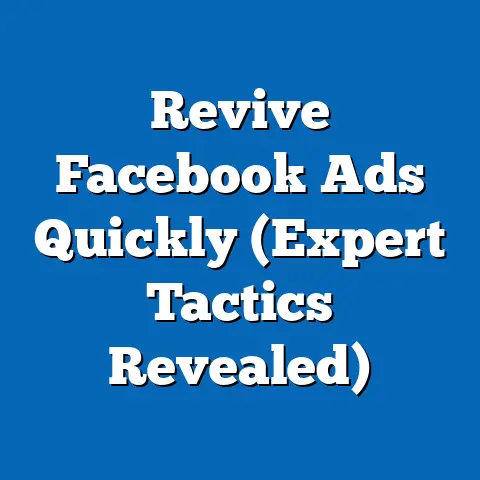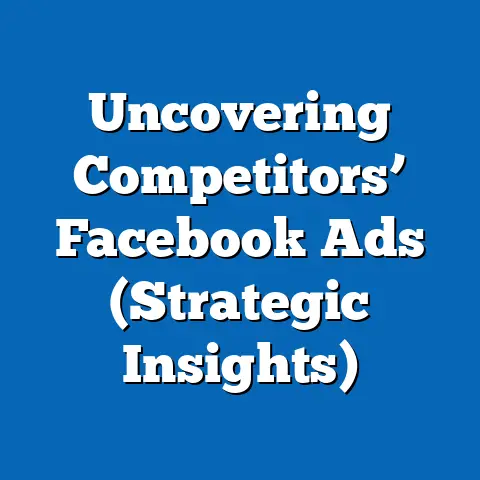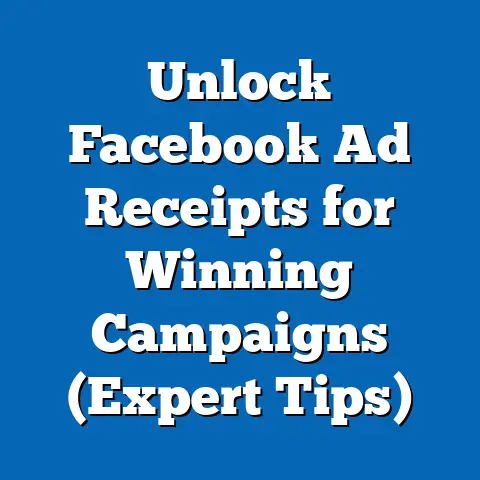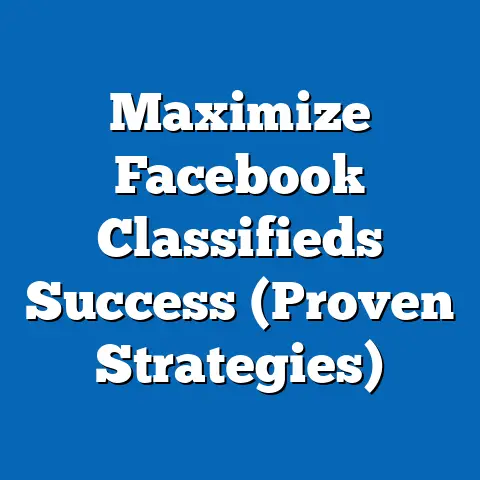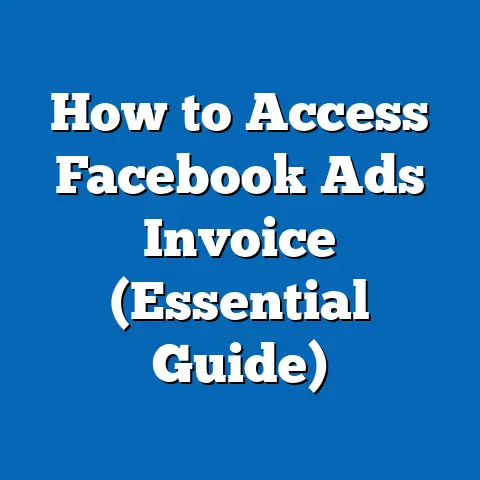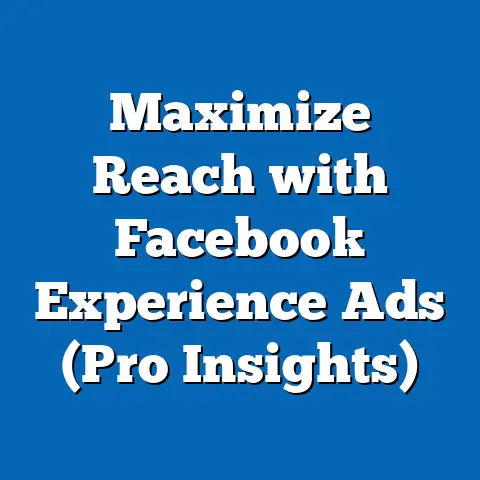Boost Airbnb Revenue with Facebook Ads (Expert Tips)
In the highly competitive world of short-term rentals, Airbnb hosts are constantly seeking innovative ways to maximize revenue and stand out in a crowded marketplace. With millions of listings worldwide—over 7 million as of 2023, according to Airbnb’s official reports—hosts must leverage cutting-edge marketing strategies to attract guests and increase bookings. One of the most effective and fastest tools for achieving this is Facebook Ads, a platform that offers unparalleled targeting capabilities and a vast user base of over 2.9 billion monthly active users.
Section 1: Fast Solutions for Airbnb Revenue Growth with Facebook Ads
Why Speed Matters in the Airbnb Market
The short-term rental market operates on immediacy—guests often book accommodations within days or even hours of searching. For hosts, this means that slow marketing strategies can result in missed opportunities and vacant properties. Facebook Ads provide a rapid solution due to their ability to target specific demographics, deliver instant visibility, and drive bookings within a short timeframe.
Speed is not just about filling immediate vacancies; it’s also about building momentum. A quick influx of bookings can improve a listing’s visibility on Airbnb through better rankings in search algorithms, which prioritize properties with consistent occupancy rates. According to a 2022 study by AirDNA, listings with higher booking rates are 40% more likely to appear in top search results, creating a virtuous cycle of visibility and revenue.
Key Defining Characteristics of Effective Facebook Ads for Airbnb
To achieve fast results, Airbnb hosts must craft Facebook Ads with specific characteristics tailored to their audience. First, ads must be visually compelling—high-quality images or videos of the property showcasing unique features (e.g., a stunning view or cozy interior) can increase click-through rates by up to 67%, per Meta’s 2023 advertising data. Second, ads should include a clear call-to-action (CTA) such as “Book Now for 20% Off!” to create urgency.
Third, targeting precision is critical. Facebook’s robust ad platform allows hosts to target users based on location, interests (e.g., travel enthusiasts), and behaviors (e.g., frequent travelers). Finally, budget efficiency ensures that even hosts with limited resources can see quick returns—starting with as little as $5 per day can yield significant impressions and clicks if optimized correctly.
Immediate Steps for Implementation
For hosts looking to act fast, the following steps can be implemented within 24-48 hours: – Set Up a Facebook Business Page: Link it to an Airbnb listing for credibility. – Create a Simple Ad: Use existing property photos and a short, engaging caption. – Target Locally or Seasonally: Focus on nearby travelers or those searching for last-minute getaways. – Monitor and Adjust: Use Facebook Ads Manager to track performance and tweak targeting or creative elements within hours.
These rapid solutions prioritize action over perfection, allowing hosts to test and refine their approach while driving immediate bookings.
Section 2: Historical Context of Digital Marketing in Hospitality and Airbnb’s Rise
The Evolution of Marketing in the Hospitality Sector
Digital marketing has transformed the hospitality industry over the past two decades, shifting from traditional print ads and travel agencies to online platforms and social media. In the early 2000s, websites like Expedia and Booking.com introduced a new era of online bookings, but marketing was largely limited to search engine optimization (SEO) and email campaigns. The rise of social media in the late 2000s, particularly Facebook (launched in 2004), opened up new avenues for targeted advertising.
Facebook Ads, introduced in 2007 as “Flyers,” evolved into a sophisticated tool by the 2010s, offering businesses in hospitality the ability to reach niche audiences. Hotels and bed-and-breakfasts began experimenting with these ads to promote deals, but it wasn’t until the sharing economy took off that individual hosts saw the potential for personalized marketing at scale.
Airbnb’s Emergence and the Need for Individualized Marketing
Founded in 2008 during the global financial crisis, Airbnb capitalized on a growing demand for affordable, unique travel experiences. Initially, hosts relied on word-of-mouth and Airbnb’s internal search rankings to attract guests. However, as the platform grew—reaching 1 million listings by 2015—competition intensified, pushing hosts to seek external marketing solutions.
Facebook Ads became a game-changer for Airbnb hosts by offering a cost-effective way to bypass the platform’s crowded ecosystem. Unlike traditional hospitality businesses with large marketing budgets, individual hosts could compete by leveraging hyper-local and interest-based targeting. This democratization of advertising aligned with Airbnb’s ethos of empowering everyday people to become entrepreneurs.
Understanding this historical context highlights why Facebook Ads are not just a trendy tool but a necessary adaptation to the evolving hospitality landscape.
Section 3: Societal Implications of Using Facebook Ads for Airbnb Revenue
Economic Impacts on Hosts and Communities
The use of Facebook Ads by Airbnb hosts has significant economic implications, both for individuals and broader communities. For hosts, targeted advertising can lead to higher occupancy rates and increased income—crucial for those who rely on Airbnb as a primary or secondary revenue stream. A 2021 report by Airbnb noted that hosts globally earned over $150 billion since the platform’s inception, with marketing-savvy hosts often outperforming those who rely solely on organic reach.
At the community level, increased bookings can stimulate local economies by driving tourism to lesser-known areas. However, there are concerns about over-tourism and housing affordability in popular destinations, where aggressive marketing by hosts can exacerbate shortages of long-term rentals. Balancing personal revenue goals with community well-being remains a critical consideration.
Cultural Shifts in Travel Behavior
Facebook Ads influence how travelers discover and choose accommodations, contributing to cultural shifts in the travel industry. Ads tailored to specific interests—such as eco-friendly stays or pet-friendly homes—reflect and reinforce evolving consumer preferences for personalized experiences over standardized hotel stays. This trend aligns with broader societal moves toward individuality and authenticity in travel, as noted in a 2022 study by Skift Research.
However, there is a risk of creating “echo chambers” where travelers are only exposed to listings that match their existing preferences, potentially limiting cultural exchange. Hosts must be mindful of how their ad strategies shape guest perceptions and experiences.
Privacy and Ethical Concerns
The use of targeted advertising raises important societal questions about privacy and data ethics. Facebook’s ad platform relies on vast amounts of user data to deliver personalized content, which can feel invasive to some users. A 2023 Pew Research Center survey found that 74% of Americans are concerned about how social media platforms use their data for advertising purposes.
For Airbnb hosts, ethical ad practices—such as avoiding overly intrusive targeting or misleading claims—can build trust with potential guests. Additionally, Meta’s ongoing updates to privacy policies (e.g., limiting data collection post-Apple’s iOS 14.5 update in 2021) mean hosts must adapt to changing regulations while maintaining campaign effectiveness.
Section 4: Expert Tips for Maximizing Airbnb Revenue with Facebook Ads
Tip 1: Leverage Advanced Targeting Options
Facebook’s targeting tools allow hosts to reach highly specific audiences, maximizing ad relevance and conversion rates. Focus on geographic targeting to attract local or regional travelers, especially during off-peak seasons. Interest-based targeting—such as users who follow travel pages or have recently searched for flights—can also yield high returns.
Expert Insight: Digital marketing strategist Sarah Johnson advises, “Start with a narrow audience to test your ad’s effectiveness, then scale up. For Airbnb hosts, targeting users within a 100-mile radius during holiday weekends can drive last-minute bookings.”
Tip 2: Optimize Creative Content for Engagement
Visuals are the cornerstone of successful Facebook Ads. Use carousel ads to showcase multiple aspects of your property—living spaces, amenities, and nearby attractions. Incorporate user-generated content (e.g., guest photos) to build social proof, as ads with authentic imagery can boost engagement by 30%, according to Meta’s 2023 ad performance report.
Additionally, craft compelling ad copy that highlights unique selling points (USPs) like “Private Hot Tub” or “Steps from Downtown.” Include limited-time offers to create urgency, driving faster booking decisions.
Tip 3: Use Retargeting to Re-Engage Potential Guests
Retargeting is a powerful tool for converting users who have shown interest in your listing but haven’t booked. Install a Facebook Pixel on your Airbnb listing page (if permitted) or direct users to a personal landing page to track their behavior. Then, serve follow-up ads with incentives like discounts or free add-ons to nudge them toward booking.
Data Point: Retargeting campaigns have a 70% higher conversion rate compared to standard ads, per a 2022 study by AdRoll. For Airbnb hosts, this can mean the difference between a vacant night and a confirmed reservation.
Tip 4: Test and Iterate with A/B Testing
A/B testing allows hosts to experiment with different ad elements—headlines, images, CTAs—to identify what resonates most with their audience. Run two versions of an ad simultaneously with a small budget, then scale the winning version. This iterative approach ensures continuous improvement without wasting resources.
Expert Tip: Marketing consultant Mark Thompson notes, “Airbnb hosts often overlook testing ad copy. Simple changes like ‘Book Today!’ versus ‘Reserve Your Stay!’ can impact click rates by 20% or more.”
Tip 5: Align Ads with Seasonal and Local Trends
Timing is everything in the short-term rental market. Use Facebook Ads to promote your listing during peak travel seasons or local events (e.g., festivals, conferences). Adjust your messaging to reflect current trends—such as emphasizing “work-from-home-friendly” spaces during remote work booms.
Case Study: A host in Asheville, NC, used Facebook Ads to target hikers during the fall foliage season, offering a “Nature Lover’s Discount.” Bookings increased by 50% over two months, demonstrating the power of seasonal alignment.
Tip 6: Budget Wisely for Maximum ROI
Small budgets can yield big results if allocated strategically. Start with $5-10 per day on a single ad set, focusing on high-intent audiences. Use Facebook’s “Lifetime Budget” option to control spending over a set period, ensuring you don’t overspend during testing phases.
Data Insight: According to WordStream, the average cost-per-click (CPC) for travel ads on Facebook is $0.63, making it an affordable option for hosts compared to Google Ads, where CPC can exceed $2.00.
Tip 7: Integrate with Airbnb’s Platform for Seamless Booking
While Facebook Ads drive traffic, the booking process must be frictionless. Link ads directly to your Airbnb listing or a personal booking page with clear instructions. Ensure your Airbnb profile is optimized with updated photos, detailed descriptions, and instant booking enabled to minimize drop-off rates.
Expert Perspective: Hospitality consultant Lisa Chen states, “A seamless user journey from ad to booking is non-negotiable. Hosts lose 30-40% of potential guests due to complicated processes or outdated listings.”
Section 5: Comparative Analysis of Marketing Strategies for Airbnb Hosts
Facebook Ads vs. Other Digital Marketing Channels
While Facebook Ads offer speed and precision, they are not the only marketing tool available to Airbnb hosts. Comparing them to alternatives like Google Ads, Instagram Ads, and email marketing reveals distinct advantages and limitations.
- Google Ads: Effective for capturing high-intent users searching for accommodations, but CPCs are higher, and setup requires more technical expertise. Best for long-term visibility rather than quick wins.
- Instagram Ads: Visually driven like Facebook, but the audience skews younger, and engagement may not always translate to bookings. Ideal for lifestyle-focused listings.
- Email Marketing: Low-cost and personal, but slow to build a subscriber list and less effective for immediate bookings compared to social ads.
Data Point: A 2023 HubSpot report found that social media ads, including Facebook, generate a 2.5x higher return on investment (ROI) for small businesses compared to search ads, making them a go-to for Airbnb hosts seeking rapid results.
Organic vs. Paid Strategies
Organic marketing—such as optimizing an Airbnb listing for search or posting on personal social media—requires no upfront cost but takes time to build traction. Paid strategies like Facebook Ads, conversely, offer instant visibility but come with financial investment. A balanced approach often works best: use paid ads for short-term boosts while building organic presence for sustainability.
Nuance: Not all hosts have the budget for paid ads, and organic strategies can be equally effective in niche markets with less competition. Tailoring the approach to individual circumstances is key.
Section 6: Broader Implications for the Sharing Economy and Workplace Dynamics
Impact on the Sharing Economy
The use of Facebook Ads by Airbnb hosts reflects broader trends in the sharing economy, where individual entrepreneurs leverage digital tools to compete with traditional industries. This democratization of marketing empowers hosts to operate as micro-businesses, but it also intensifies competition, potentially leading to market saturation in popular destinations.
Additionally, the reliance on platforms like Facebook for revenue growth ties hosts to tech ecosystems, raising questions about dependency and platform fees. As Meta continues to adjust ad algorithms and pricing, hosts must remain adaptable to maintain profitability.
Workplace and Host Dynamics
For many Airbnb hosts, managing listings is a side hustle or full-time gig, blurring the lines between personal and professional life. Effective use of Facebook Ads can reduce the time spent on marketing, allowing hosts to focus on guest experience and property management. However, the pressure to constantly optimize ads can add stress, especially for those new to digital advertising.
Solution: Tools like Canva for ad design and Hootsuite for scheduling can streamline workflows, while outsourcing to freelance marketers is an option for hosts with larger budgets.
Cultural and Social Shifts in Hospitality
The shift toward personalized, data-driven marketing via platforms like Facebook mirrors larger cultural changes in how hospitality is perceived. Guests increasingly expect tailored experiences, and hosts who master targeted ads can meet these demands. Yet, this hyper-personalization risks commodifying hospitality, where human connection is secondary to algorithmic efficiency.
Balancing tech-driven strategies with genuine hospitality—such as personalized welcome messages or local recommendations—ensures that the cultural essence of Airbnb remains intact.
Section 7: Challenges and Nuances in Using Facebook Ads
Diversity Among Airbnb Hosts
Not all hosts have the same resources or technical skills to implement Facebook Ads effectively. Those in rural areas may struggle with smaller target audiences, while urban hosts face higher competition and ad costs. Additionally, language barriers or lack of access to high-quality photography can hinder ad performance.
Solution: Platforms like Fiverr offer affordable services for ad creation, while free resources like Meta’s Blueprint courses can teach beginners the basics of advertising.
Algorithmic and Platform Risks
Facebook’s ad algorithm is constantly evolving, and changes can disrupt campaign performance overnight. For instance, the 2021 iOS privacy update reduced tracking capabilities, lowering ad effectiveness for some businesses by 15-20%, per eMarketer. Hosts must stay informed about updates and diversify marketing channels to mitigate risks.
Avoiding Overgeneralizations
While Facebook Ads are broadly effective, success varies based on location, property type, and guest demographics. A luxury villa in Bali may require different ad strategies than a budget apartment in Chicago. Hosts should avoid “one-size-fits-all” approaches and customize campaigns to their unique context.
Section 8: Forward-Looking Insights and Uncertainties
The Future of Digital Marketing for Airbnb Hosts
As technology advances, the role of Facebook Ads in the Airbnb ecosystem will likely evolve. Emerging tools like AI-driven ad optimization and augmented reality (AR) previews of properties could enhance campaign effectiveness, offering guests immersive experiences before booking. Meta’s investment in the metaverse also hints at virtual “tours” becoming a marketing norm.
However, uncertainties remain. Regulatory changes around data privacy could further limit targeting options, while rising ad costs may challenge small-budget hosts. Staying ahead of these trends requires continuous learning and adaptability.
Long-Term Societal Impacts
The widespread adoption of targeted advertising in the sharing economy could reshape travel patterns, with lesser-known destinations gaining visibility through strategic ads. Yet, this may also deepen inequalities if only well-resourced hosts can afford effective campaigns. Policymakers and platforms like Airbnb may need to intervene with training or subsidies to level the playing field.
Final Thought: While Facebook Ads offer a fast track to revenue growth, their long-term impact on hospitality, community dynamics, and cultural exchange warrants ongoing discussion. Hosts who balance profitability with ethical practices will likely thrive in this evolving landscape.
Conclusion
Boosting Airbnb revenue with Facebook Ads is a powerful, fast-acting strategy that leverages the platform’s vast reach and targeting precision to drive bookings. By understanding the defining characteristics of effective ads, appreciating the historical context of digital marketing in hospitality, and considering societal implications, hosts can implement campaigns that deliver immediate results while fostering sustainable growth. Expert tips—ranging from advanced targeting to seasonal alignment—provide a roadmap for success, though challenges like platform changes and resource disparities must be navigated with care.
Looking forward, the intersection of technology and hospitality promises exciting innovations but also complex uncertainties. Airbnb hosts who embrace Facebook Ads as part of a broader, adaptable marketing strategy will be best positioned to thrive in an increasingly competitive market. As the sharing economy continues to evolve, balancing revenue goals with community impact and guest satisfaction remains the ultimate goal.

